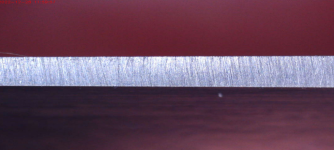Rick Smith
New member
Can anyone recommend a good knife sharpener or share your technique for sharpening?
I have a WorkSharp hand belt sharpener. It's dead easy to use,I can put an edge on a bowling ball with it. My brother even bought one to keep his orchard pruners sharp.
Can anyone recommend a good knife sharpener or share your technique for sharpening?
you should sell it on flea-bay.I bought the Worksharp Ken Onion Edition. Tried a couple times with it, got frustrated it sits in a box in the basement in a now forgotten location.
I likely will. But when I get time and the gumption to try it again I intend to give it another go. Once I find where I stashed it that isyou should sell it on flea-bay.
Just buy it from Amazon. If you don't love it I'll let you return it.Maybe you could chow a closeup of it working


